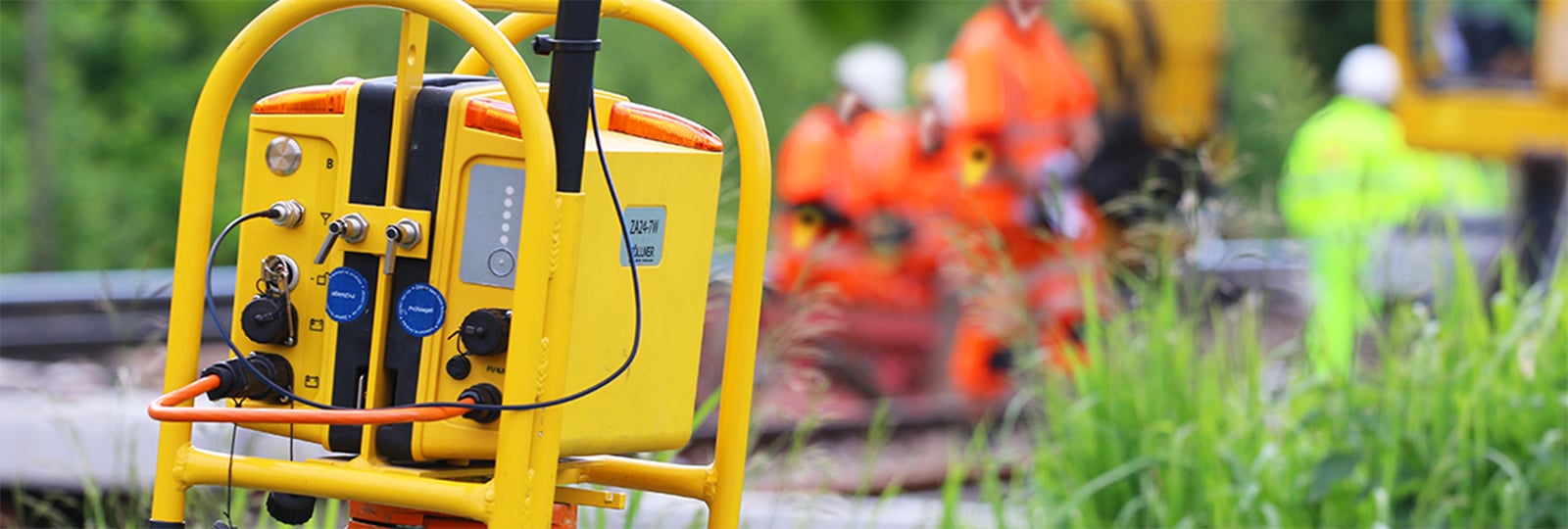30.03.2021
Early warning system for track workers
In many countries around the world, the rail network is one of the most important transport routes. In Germany alone, around 39,000 trains move daily on a route network of over 33,000 kilometers. Regular maintenance and servicing of these important traffic arteries is imperative and ensures safe and smooth rail traffic. An acoustic system from ZÖLLNER Signal GmbH is used to warn the maintenance staff on the rails in good time of approaching trains – protected by the robust housing from ROSE Systemtechnik.
The ZÖLLNER group of companies has set itself the goal of making traffic on waterways and rail, as well as work on and on the tracks, safer. The family company was founded in 1946 and has been producing acoustic signal systems for shipping ever since. Among other things, Zöllner is known for its Makrofone® – compressed air operated acoustic signal generators. For more work safety on track construction sites, ZÖLLNER has been developing, manufacturing and selling automatic warning systems since the 1990s. They alert the construction workers on the line that a train is approaching.
One of the Zöllner products is the Autoprowa® warning system, in which the volume of the signal tone automatically adapts to the ambient noise. The so-called Autoprowa®-Effect + thus offers optimal protection for the maintenance staff of the rail network and reduces the noise level to a necessary level in order not to unnecessarily burden residents with more noise.
The signal system can be operated by cable or radio
Depending on the area of application and requirements, ZÖLLNER provides wired and radio-based systems. All variants work according to the same principle: First, an approaching rail vehicle is recorded manually or via train detectors or via interlocking information. Then the information is passed on and a warning is triggered. The entire system is controlled by a separate control center (ZRC) or the warning device (ZPW), depending on the requirements. Once the rail vehicle has passed the construction site, the warning is withdrawn and the previously interrupted work can be continued.
Warning occurs even over long distances
The mobile wireless warning system MFW from ZÖLLNER uses the latest technology. All radio components are in bi-directional contact with each other and thus ensure optimal communication. The system corresponds to the safety level SIL 4 and offers the highest level of safety for the people working on the track as well as great flexibility and high comfort for the user. Since various innovative radio technologies are used, warning information can be transmitted over great distances. The compact system is particularly suitable for use on short-term and locally limited construction sites.
Bidirectional radio for maximum security
And this is how the radio warning system works in detail: The train detector detects journeys inductively and is connected to the radio transmitter by cable. When a train passes by, the MFW switches on. Thanks to the automatic and safe radio transmission of the signal to the work site, all intermediate and external security posts can be omitted. Another advantage: The system can be installed quickly and easily and is therefore ready for use in a very short time. Even if the workplace and the switch-on point are geographically unfavorable or far away, a secure radio connection between the transmitter and receiver is always guaranteed. If the installation of a rail detector is not possible or too complex, a radio transmitter worn and operated by an external security guard serves as a mobile manual switch. The operator’s attention and ability to work is monitored by special sensors in the device; after a warning has been triggered, the operator receives switch-on information by means of bidirectional radio from the construction site. The system can be flexibly adapted to the conditions of the job. Zöllner also offers mobile, body-worn receivers and hand-held devices as accessories for the MFW, as well as optical and acoustic warnings integrated into the protective clothing (e.g. on the helmet or hearing protection). The deactivation of the warning in the system takes place centrally for all components, whereby each radio unit can serve as a control center.
ROSE housings protect the electronics from environmental influences
So that the sensitive signaling technology of the MFW is not damaged in rough construction site operations, the components are installed in a robust special housing from ROSE Systemtechnik. “ZÖLLNER already asked us in 2008 about a solution for the MFW”, recalls Jeannette Kossmann, Area Sales Manager at ROSE Systemtechnik. At that time, the Kiel company was already using polyester, polycarbonate, aluminium and pilot manual control housings from ROSE for other warning systems.
When inquiring about the MFW at that time, however, there was no suitable housing in the standard range that met all requirements. “We then offered a custom-made product without further ado,” says Axel Brandhorst, Head of Design at ROSE. ZÖLLNER took on the rough development of the housing, while the housing specialists from Porta Westfalica were responsible for the design and production-ready implementation. The engineers and technicians from ROSE also brought detailed solutions from other products in their portfolio.
Individual adjustments are not a problem
The special housing made of polyamide should be equipped with various metallic screw points and partially provided with an EMC shield coating. In addition, it should have an upper and a lower shell. “It was quite a challenge to achieve the required thick-walledness and shape in a thermoplastically manufactured housing,” says Brandhorst. He and his colleagues initially used a manual small-series tool, but quickly realized that the component quality fluctuated too much and the increasing number of units could not be managed with this production method. “That’s why we switched to a fully automatic series tool relatively soon.”
Signal color ensures good visibility
So that the mobile radio warning system is not only easy to hear, but can also be seen from a distance, ROSE makes it out of a yellow plastic. Since the company – unlike many competitors – operates its own production facility including a paint shop, it can also coat neutral housings in any color. Approx. 14,000 housings are refined per week for a wide variety of customers in production. ROSE also differs from other housing providers on the market in that it has a large design team, a very wide range of products and great flexibility: if a standard housing is not an option for an application, a custom-fit solution is developed. The customers benefit from the great know-how of the engineers and technicians, who are very familiar with many areas of application and materials and therefore always find the optimal solution.
The success proves ROSE right: Today companies from a wide variety of industries use housings from Porta Westfalica – from the automotive and process industries to mechanical and plant engineering.

